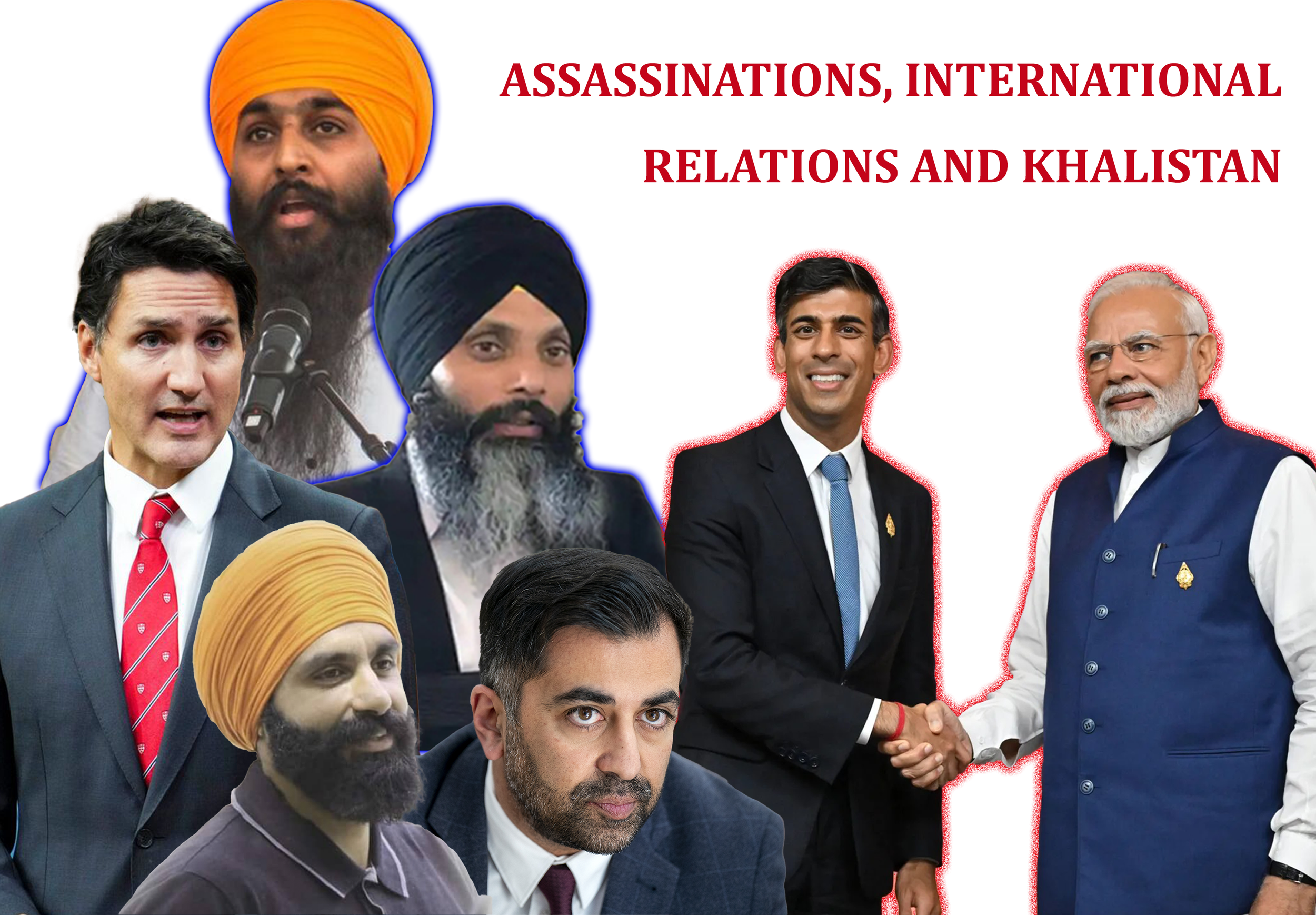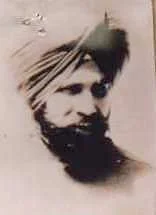Shaheed Bibi Amandeep Kaur Amar Hai
/Trigger Warning: this article talks of state violence, with references to sexual assault, rape, torture, and murder. All indented quotes are from ‘The Rape of Punjab: Indian State’s Indignities on Sikh Women and Children’ a report written by the Punjab Human Rights Organisation (PHRO) (which later became the International Human Rights Organisation (IHRO) both are now defunct having faced decades of state repression) that set up a three- member committee of the Punjab Nari Manch (Women's Forum) consisting of Dr. Jiwan Jot Kaur (Vice President of the IHRO), Miss Kamal Sandhu, and Sri Ganpat, Advocate, to tour some villages in Batala and Ludhiana districts to document human rights abuses.
…the Central government has granted unlimited powers to armed units [“black cats”] so that they can suppress the voice of revolution in Punjab. The police and the security have started these atrocities on women for they have been unable to bring to submission the young people of Punjab by resorting to unlawful arrests, torture in special prisons and even killings in so-called encounters. This is a direct challenge to the self-respect and dignity of the people of Punjab.
On January 21st 1992 Bibi Amandeep Kaur from Pipli pind in Bathinda was killed by indian police forces in Punjab, she was 20 years old. Researching and writing about her story has been challenging. I look with awe to those Gursikhs with planet sized hearts that carried the immeasurable pain of their contemporaries with the stillness and ferocity required to fight off the paralysis of State terror.
To us Shaheed Bibi Amandeep Kaur isn’t just a story, her life isn’t just an account, or a case to be viewed as a series of ‘events’ that document isolated human rights abuses to be presented to structures that exist to maintain the violence she endured in exchange for “justice”. We owe her life much more than that. In order for us to comprehend her reality and stand with her we have to see the Sikh struggle for Khalistan through which she lived.
We know very little about our sister beyond the statement she gave to human rights workers, and her statement reveals next to nothing about how she was feeling, her hopes or fears, yet still Bibi Amandeep Kaur’s voice gives voice to so many others. What is clear from Bibi Amandeep Kaur’s statement is that she was tortured and abused because she was the sister of a Kharku (Sikh freedom fighter), the violence inflicted upon her was a perverse revenge directed at her brother and his contemporaries.
The original statement Bibi Amandeep Kaur gave, presumably in Punjabi, was taken by the PHRO, as part of their reporting into human rights abuses committed against Sikh women and children for their “political and religious views”. The original Punjabi versions of the statements they collected seem likely lost forever. What is important in the report of the PHRO is that they acknowledged (many times) that the scope of their investigation was very limited, for example: “we feel the extent of repression has crossed all limits of civilized behaviour in Punjab. Although we have covered only two areas, of which Batala area is the worst affected, it forms only the tip of the ice-berg of what is happening all over Punjab.” The significance of this statement is all the greater when you consider the scale of this:
A teacher at the Academy, whose name we shall withhold, narrated to us an incident that epitomized the police campaigns under Govind Ram. In the forenoon of January 10, 1989, contingents of the Punjab Police and the Border Security Force in hundreds swooped down on the village, Sarchur, which has a population of 4000. The forces were being led by the SSP, Govind Ram. He ordered them to round up the Sikh inhabitants of the village and a number of small villages in its vicinity like Kotli, Parowal, Nasirke, Kalowal, Tripaye and Pangale and to muster them at the focal point in the outskirts of Sarchur (the ground for cattle fairs and village markets). Mixed batches of the BSF and the Punjab police went round the villages, pulled out the persons working in their fields, walking in the bazaars and lurking in their houses and shepherded them to the specified location.
He [Govind Ram] then ordered all the young persons in the assembly to fall on their bellies to the ground, which they did. The personnel of the Punjab police and the BSF lashed them with their leather belts, batons and bamboo poles. The public flagellation lasted for more than one hour. Govind Ram then asked the assembly to rant after him the outrageous pronouncements he execrated for Mrs. Surjit Kaur, an Akali Dal leader from Sarchur, in jail for the last five months and her young daughters living with their father in the village. At this point a retired army officer, Charan Singh of the village Pharowal protested. He refused to abuse them.
Govind Ram ordered that he be taken into custody. Charan Singh was caught and pushed into a police truck. Govind Ram then forced the villagers to repeat those abuses and went on to pronounce that if ever Surjit Kaur came out of jail he would make her and her daughters dance naked before a similar audience in the village. Govind Ram went away with his forces at dusk after announcing that the next time it will be the turn of the women to be assembled and treated in a similar way.
[The narrator then tells how many of the women of the village moved far away to the houses of relatives]
The school, we had been told, was concerned mainly with upbringing and education of the children whose parents had suffered State atrocities. Fifteen children studying at the Academy had lost their fathers in so-called encounters. At this school, we were taught about the campaign of terror which Govind Ram, the Senior Superintendent of Police of Batala police had been carrying out in the villages within his domain, ostensibly to demoralise the Sikh militants.
Govind Ram was one of the most vicious mid-rank police officials, his viciousness was well known - and valued by his superiors, he enjoyed the protection of his own squad of police officers and “black cats” (covert death squads made up of criminals). Incidents like the one above were common in his area of operation.
Shaheed Bibi Amandeep Kaur was the elder sister of Shaheed Bhai Harpinder Singh ‘Goldy’ of the Khalistan Commando Force (KCF), he attained Shaheedi on 25th June 1992, aged 18, a few months after the Shaheedi of his sister. Bhai Harpinder Singh joined the KCF in college, the attack on Sri Darbar Sahib and the injustices the Quam faced were too much for him to bear, so like many of his contemporaries he picked up arms to fight for the abolition of the indian state.
The ranks of indian security forces were filled with cowards and sadists like Govind Ram, they lacked the courage to face Guru Sahib’s Khalsa in the battlefield unless they had the advantage of overwhelming force and superior firepower. Even with such advantages there have been documented incidents when the military units of Khalistan have issued open proclamations in Punjab’s newspapers calling for indian paramilitary to face them and answer for the crimes they committed against civilians in order to undermine the struggle for Khalistan - and entire divisions have chosen to hide in the safety of their fortified police stations rather than face prepared and waiting Sikh forces; clearly if we will not forget the battle of Sri Darbar Sahib then neither will the indians.
Instead a favoured tactic of indian forces was to instil fear in the civilian population through targeting the families and villages of Sikh freedom fighters. This strategy is a key part of what india meant when it talks of “stamping out militancy”, this is why systematic and widespread human rights abuses took place - to suppress the Khalistan struggle, to demoralise Sikh fighters, and break their popular support.
Human rights abuses and Khalistan are interconnected in a way that is not spoken of by Sikh organisations that claim to represent the Panth. The indian state collectively punished the Sikh population of Punjab because Sikhs have a political aspiration that transcends the idea of india itself. Therefore supporting Sikh fighters was violently punished, even when that support was food, rest, or just a suspicion or a perception of possible support based on a Sikh being Amritdhari, or a family member of a Kharku. The indian state wanted to remove Khalistan from the bodies and minds of Sikhs - our Shaheeds fought and died to keep Khalistan alive - so when we separate Khalistan from the human rights abuses we are not being smart or ‘politically correct’, or making the discourse more accessible, we are perpetuating the indian state’s violence, upholding their bid to erase Khalistan.
His younger brother, Kulwant Singh had joined the rebels. The police raided his house a number of times looking for Kulwant. His mother Prakash Kaur had been taken to the police station for interrogation about 15 times.
During one of the raids, another younger brother, Dilbagh Singh, a minister at Baba Bakala Gurdwara, hid behind the house. The police shot Dilbagh in the back and killed him. The team saw bullet marks on a wall of the house. Manjit Kaur (wife of Dilbagh Singh) was badly beaten and dragged by the hair to a wheat field. After about an hour and a half of torture, she fainted and was thrown over the body of Dilbagh Singh with a taunt: "Now get your Khalistan."
Bibi Amandeep Kaur will never receive justice if the cause and struggle of her Sikh siblings is erased. The indian state can never give any justice, it will never be within its power to do so. Shaheed Bhai Harpinder Singh was aware police were raiding his village, he knew they were harassing his family, and like his contemporaries he understood why this was happening, this profound understanding is what led this young college student to pick up arms. The sacrifices of these Shaheeds and their sidak has never be rivalled by the Panth that claims them. For example, today in the farmers struggle, people in Punjab hold up signs saying “we’re farmers not terrorists” inadvertently holding up definitions the state has violently imposed upon Sikhs. Some look to Bhagat Singh for inspiration perhaps because he is a safe icon, one that evokes revolution but does not threaten the concept of the indian state itself. Then there are those of us that talk solely of human rights abuses and genocide but fail to mention that Sikhs were fighting for their liberation in a conflict stretching back centuries and this is why the indian state responded with genocide.
Bibi Amandeep Kaur was arrested along with her father and newly-wed husband on the 24th of October 1991 - on their way out of a court house after registering their marriage. By 1991 indian police forces had been running rampant in Punjab for over a decade, the brazen way they abducted Bibi Amandeep Kaur and her family was at this point routine policing.
This chronicle of police atrocities is hardly complete. It is impossible to survey all the villages of Punjab. People are afraid even to speak.
Bibi Amandeep Kaur, her husband, and father were taken to Phul police station in Rampura. Her father and husband were stripped naked in front of her then beaten and humiliated. The police robbed all their cash and gold jewellery, they were moved to another police station where Bibi Amandeep Kaur was tortured and raped. The police even went to Bibi Amandeep Kaur’s village to rob their house and abduct her mother and sister, her mother was brought her to a police station and also tortured and raped. When their family was finally released after three weeks of illegal detention and abuse the police registered a case against her father. Her terrified newly wed husband abandoned his wife and fled the country.
The registering of (often multiple) cases is a key part of the indian state’s strategy to maintain its harassment by criminalising individuals the police persecute, keeping them under surveillance, maintaining an environment of fear throughout Punjab - which lasts till this day.
This ordeal wasn’t the result of some rogue police officers or some kind of ‘isolated’ or covert incident. This was state sanctioned violence with impunity involving dozens of officers, low level ones and their seniors, and at least five police stations, including the head office of the ‘Crime Investigation Agency’ (CIA), the special branch of the “Punjab Police”. This systematic, and widespread abuse was sanctioned by the highest levels of government, with the complicity of the entire indian state machinery, its judiciary, bureaucracy, media, and academia. Within the details of how Bibi Amandeep Kaur and her family were treated is a pattern that is visible in the treatment of thousands of Sikhs.
An old person with a silver beard, small bulgy eyes and a gloomy frown, his forehead puckered in umpteen furrows was sitting on a bed. He spoke to us clearly and tranquilly, words rising to the surface as if from a deep stillness within. We asked him: Why is Govind Ram doing this? Does he suspect that terrorists are hiding in here? Does he suspect any one in particular? What does he want you people to do?
…In this village, most of us here are Amritdharis. May be he thinks that we are the enemies. May be he wants us to become the enemies.
Below is the original english transcript of Shaheed Bibi Amandeep Kaurs statement to the PHRO:
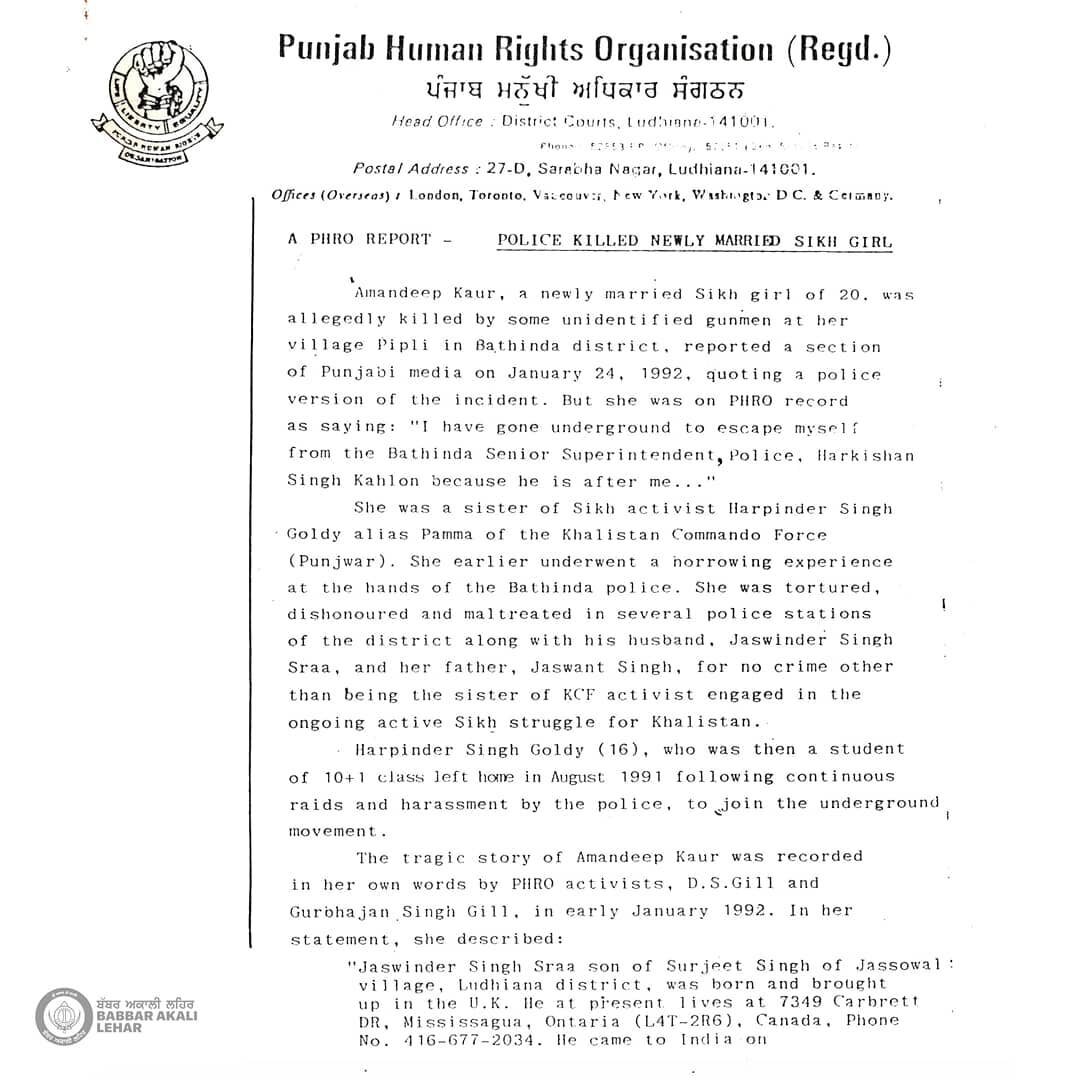
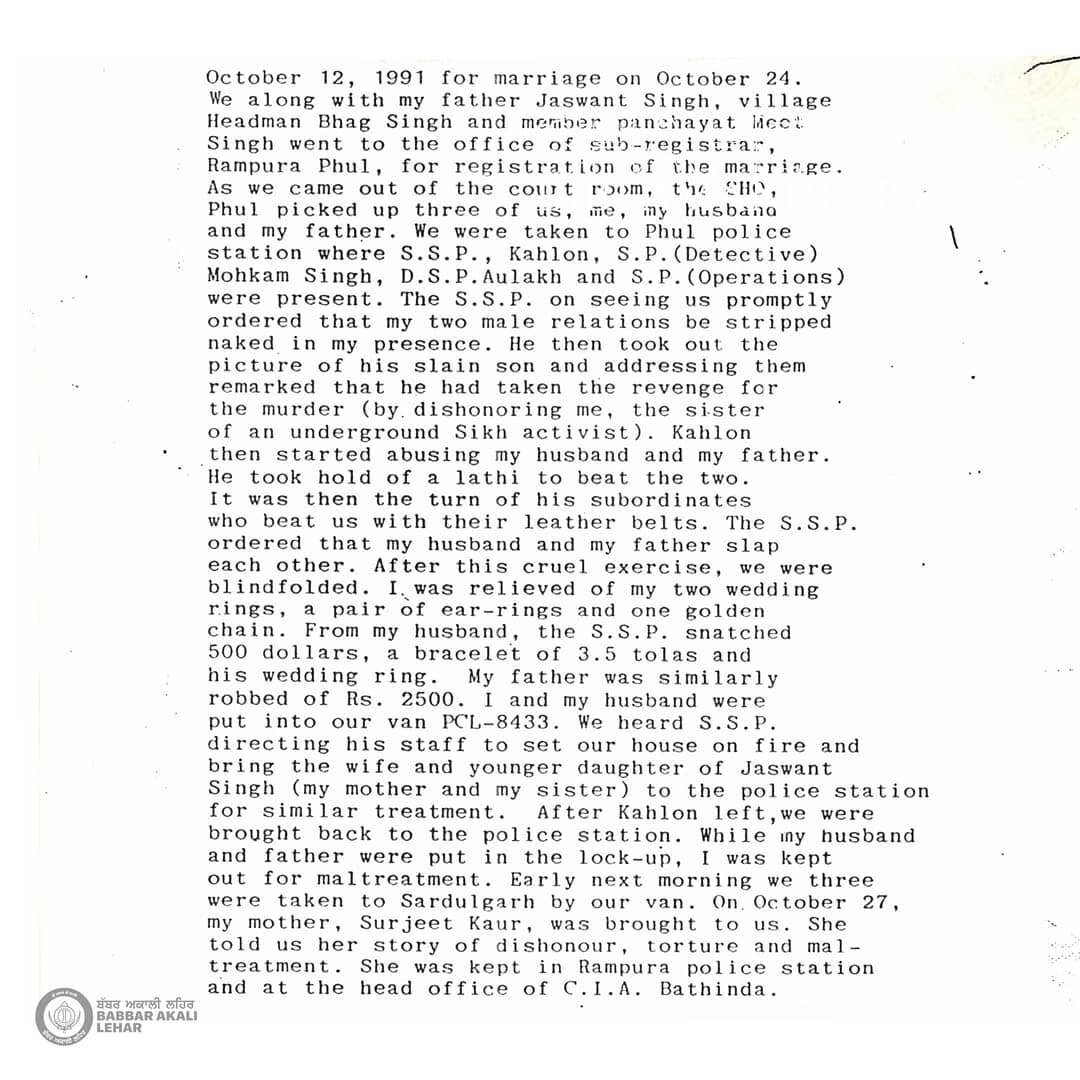
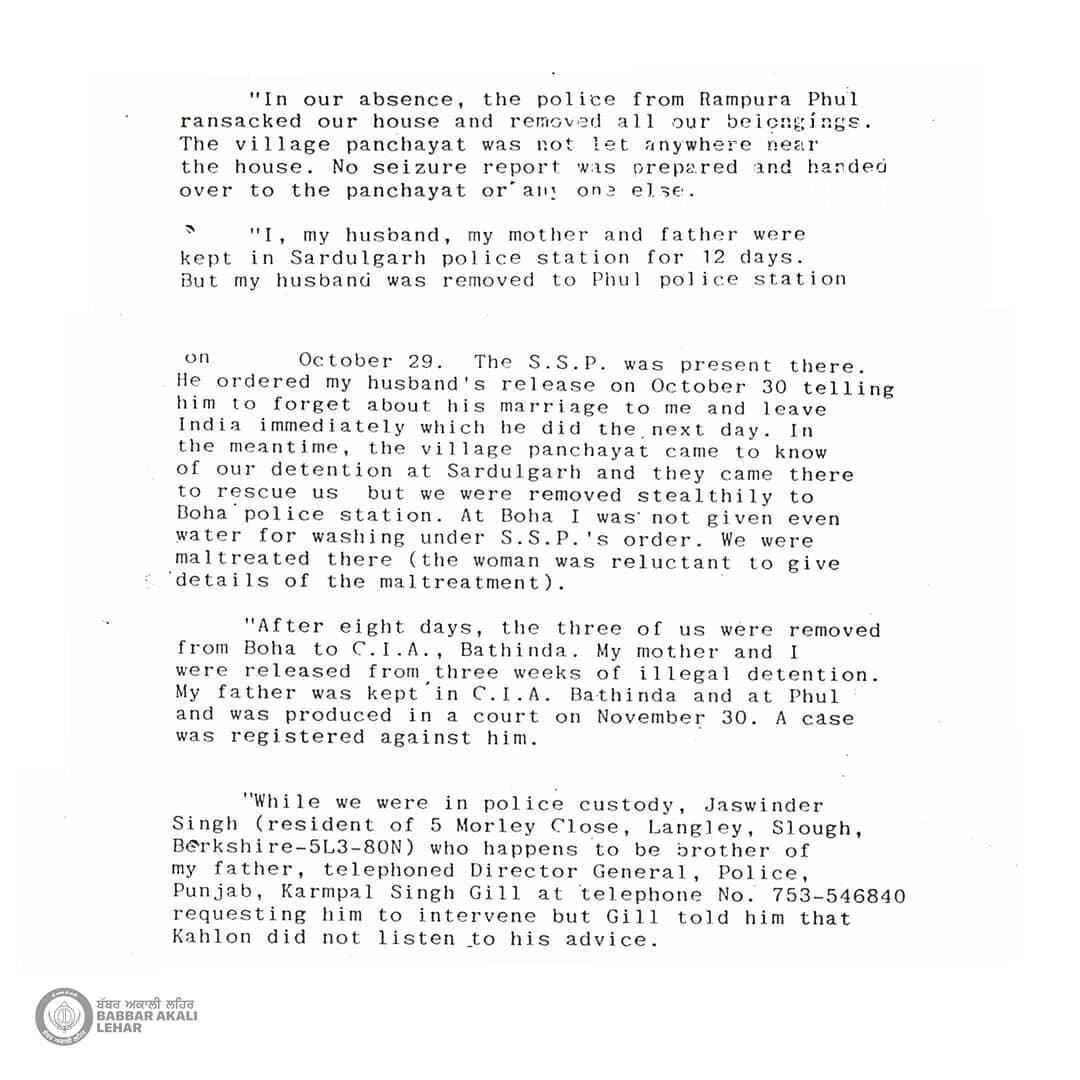
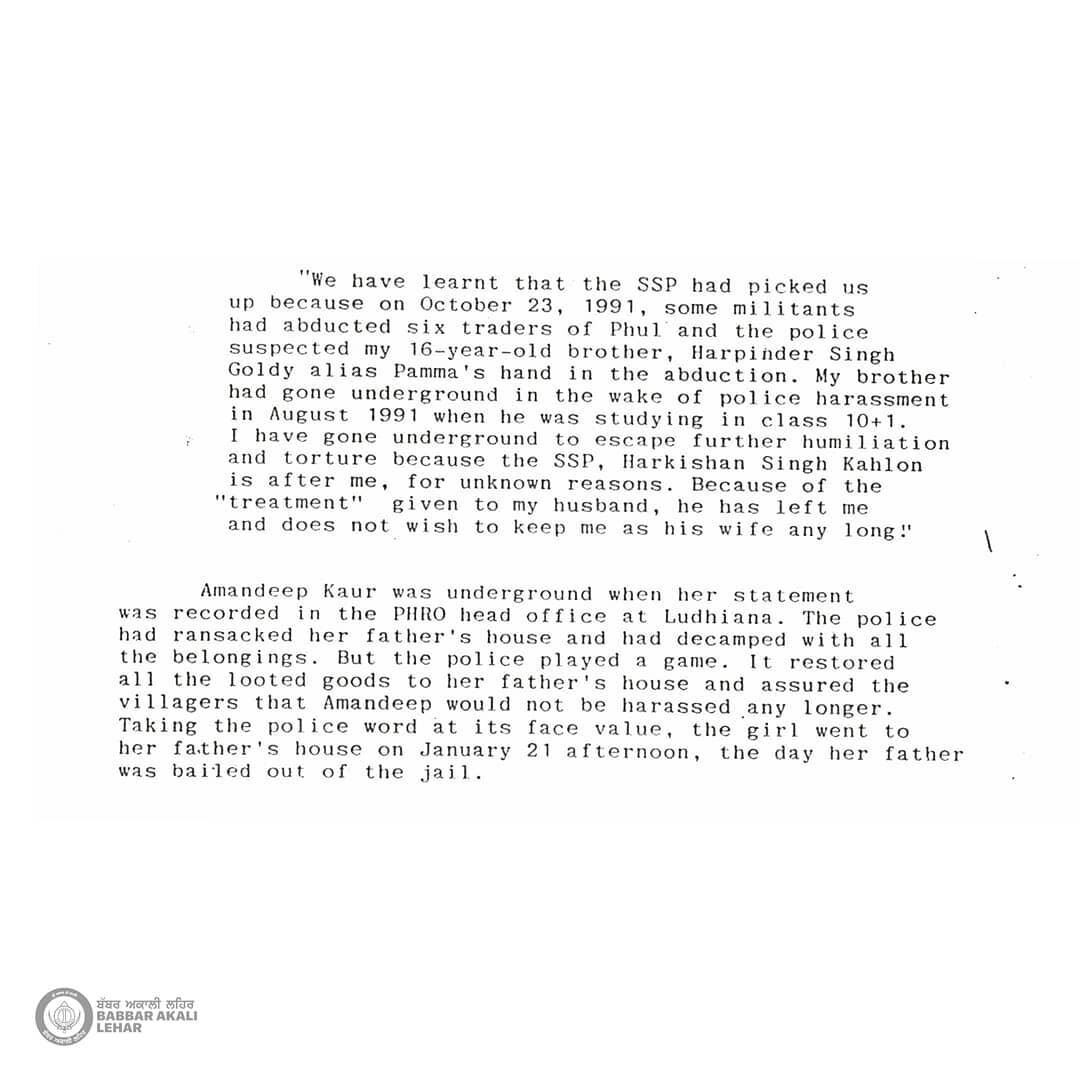
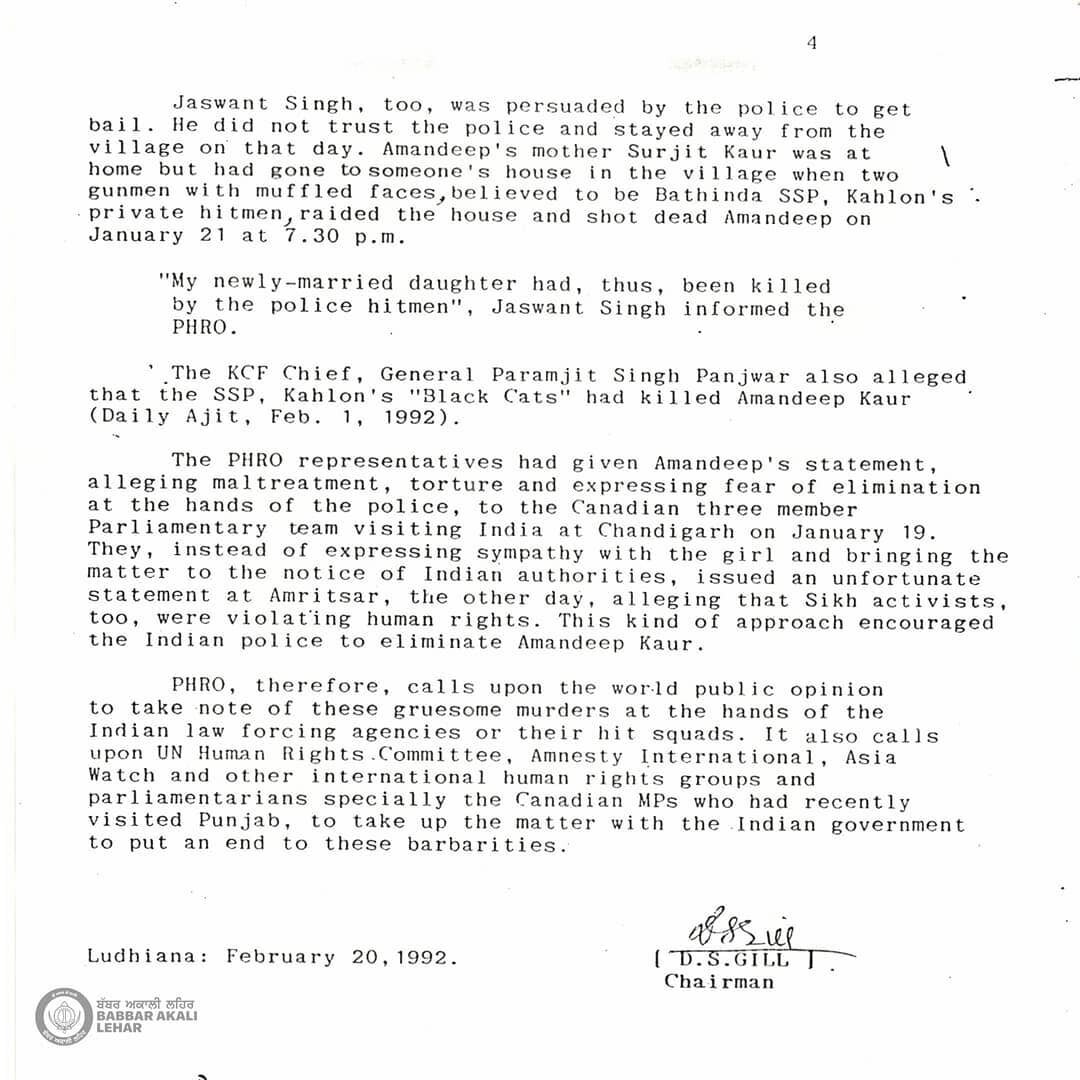
Bibi Amandeep Kaur went into hiding in early November 1991 and stayed in hiding until January 21 1992. The police then sent a message asking her to return to her house, returning all her property and insisting they would not harass her any more. They also bailed her father the day before the message was sent out as part of their plan. Amandeep Kaur returned to her home, and when her mother was out, two gun men with masked faces came on behalf of SSP Kahlon of Bathinda, and shot Amandeep Kaur dead on January 21st at 7:30pm.
Now another phenomenon has come to our attention, that is, the work of armed gangs under the direction of the police. Many incidents of this nature have come to our attention but are beyond the scope of this report. The excesses of the police are commonplace; these practices can be traced back to the top brass of the police and Central government in Delhi.
Shaheed Bibi Amandeep Kaur, Shaheed Bhai Harpinder Singh, will live forever in the memory of the Panth Khalsa, and the countless others like them will all continue to be remembered in our Ardaas. Their sacrifices, stories, and realities will be kept alive by those that have love for the Khalistan sangarsh.
When we erase the context, when we erase Khalistan, our Shaheeds like Bibi Amandeep Kaur will never be allowed to be anything other than victims, statistics in some report that we hope a politician will read, more likely gathering dust, waiting to be forgotten, stripped of their humanity. When we remember the context then justice becomes solely our prerogative and our responsibility, we are not forced to mutilate our own memory, or become cowards or beg those that killed our siblings for “justice” - our Shaheeds become what they always have been, the guiding towers of light that fuel our spirit and struggle.
Khalistan Zindabad
It is hard to stress the point enough that indian state violence was so widespread that it still reverberates today. To illustrate the point that the violence against Sikhs was widespread and systematic we can look to Ensaaf who have documented 5,302 - and counting instances of state murder. Out of those 120 are females, and in 1992, the year that Bibi Amandeep Kaur was Shaheed, there were 14 Kaurs aged between 19-30 that were also Shaheed, nearly all of them were killed alongside multiple family members. We may never know all their stories, and we only have 11 of their photographs (information below from Ensaaf).






